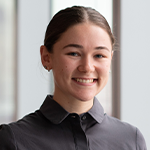Why did you choose a job in this profession?
While I was at university I would regularly interact with academics, which contributed towards a feeling that pursuing a PhD was the next logical step after my degree. But during my third year I realised that what I enjoyed most about my degree was not planning and conducting experiments but the opportunity to critically analyse scientific concepts within essays and discussions. Therefore, I started to explore my options for a role that incorporated these aspects of my studies.
During the search for my next steps, I attended a university careers fair. This was the first opportunity I had to interact with Patent Attorneys and to get an initial insight into the profession. I found the idea of mixing a broad range of scientific subjects with law and problem solving particularly appealing. Subsequently, I attended open days and undertook work experience to get a real feel for what the role would entail on a day-to-day basis, and I quickly became confident that this was the role for me.
How did you get your job and any advice for joining the profession?
I attended the Voluntary Vacation Scheme run by Boult shortly after finishing the third year of my degree. The scheme involved a series of lectures about the profession and various workshops intended to get us thinking about the main principles of patent law. We were also given the opportunity to prepare a letter regarding the patentability of an invention. Following the scheme, I was invited to two interviews and very happily accepted an offer for a role as a Patent Trainee to start after the fourth year of my degree.
For anyone looking to enter the profession, I would recommend taking up as many opportunities as possible to speak to those already in the role. It takes quite a while to qualify as a Patent Attorney and there are large time commitments when preparing for exams, so before you start training it is ideal if you are pretty sure that the role is right for you. The nature of interviews will vary depending on the firm, but as part of my interview preparation I found it helpful to try to explain scientific concepts clearly and precisely to someone not familiar with these concepts.
What are your main duties and what skills are useful in the profession?
I am currently in my second year of training. I assist with many different tasks associated with different stages along the timeline of a patent, from drafting and filing an application to grant and opposition procedures. The cases I have worked on so far have been related to a wide range of subjects, such as antibodies, DNA sequencing and devices for biotechnological applications. A large amount of my time is spent constructing arguments in response to comments that have been made by patent examiners and I am also becoming more involved in meetings with inventors.
From the beginning of my job, I was given my own caseload to manage, which was incredibly useful for getting me up to speed with the organisation and time management requirements that are essential for the role. It is necessary to be articulate and conscientious, and to be able to understand new scientific concepts quickly. It is also important to note that the job is generally 9-5, but sometimes you may be required to work longer hours, for example to meet urgent deadlines.







